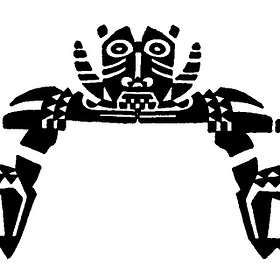—: The Market-Place :— Stuff of men you come and go like not-quite-mute-birds scattering their furtive symphonies in a small closed parallel where the sinews of the sky are only the top boards nailed down.
—: Spirit Of The Street :— Gradually, the street emerges distinct—an exile of silence, men, for the brief slant of a night have ceased to obscure it with the obscurity of its name. Only the wind— its spirit— fable that looms the moments of all skeletons' massives —is there— groping through the exile for the spirit of its vision.
—: Poem :— Across the morning I spear the articulate flight of a bird and make of it the design of my private disguise against the uncertain morning. (Once, the earth hanging half-way like an imaginary shadow remarked the palpitations of your white heart, bird; you carried your flight ever nearer to the sun-vortex; that was your reply.) Forget the trembling bird remember only the triumphant solution of the sweep, Earth,—but O do not unravel it! seeking the dusty count of one more 'clarity' You can find merely an endless swirl of gauze contriving somehow wantonly within the relativity of space to be singularly free.
—: Epitaph :— Compromises are lean upon the night, O poet, when night betrays the evasions of the mind and heart with its lightnings; but once in a century the night discovers a nakedness . . . to such a one the night gives itself . . . not with an earthly nicety but more with that delicate complete submissiveness reserved for the moods of the wholly dead . . .
Pauline Leader (b. 1908) was: “A young poet living in New York City. Her work has appeared in Transition and in Poetry.” (Blues, 1929)
Alongside a handful of published poems, Leader also wrote an autobiography, titled And No Birds Sing (1931): “This memoir offers an unflinching look at the life of a deaf woman struggling with poverty and isolation in the bohemian enclave of Greenwich Village. In harrowing yet lyrical prose, Leader recounts her experience growing up as the daughter of Jewish immigrants in a small New England mill town. Born in 1908, Leader was exposed to frequent verbal and physical abuse. She became deaf at the age of 12, following a long illness. As a teenager, she ran away to New York City, where she found work in factories and sweatshops, and... sought community among the artists and eccentrics of Greenwich Village.” (Gallaudet University Press, 2016)
“In 1932, Ethel Mannin called the young Pauline Leader’s literary debut, ‘a terrible indictment of the social system and the moral code’, proclaiming, ‘everybody who doubts the need for a revolution should read this book’. The review appeared in Mannin’s monthly literature column, ‘Sagas of the Working Classes’, in the February edition of The New Leader, a magazine closely associated with the United States Socialist Party… But while Leader was indeed an outspoken communist, Mannin’s review is not a reaction to a manifesto. Leader’s And No Birds Sing is the first hand account of a deaf poet’s internal experience of disability and class and the external social structures which mediate and construct that experience.” (Carl Nelson, A Hundred Houses: Pauline Leader and the Spatial Poetics of Disability, 2019)
For Pauline Leader by Dick Whyte I. bigger & bigger shadows stretching across the dirt II. earth chants: to grow is to give to grow is to give to grow is to give to grow is to give . . . III. the gods do not listen & no birds sing
Forgotten Poets Presents:
Forgotten Poems, a living anthology of obscure and out-of-print poetry from the late-1800s and early-1900s. Explore the archives:
More poems about the earth . . .
Anne Spencer - 5 Short Poems (1920-1975)
—: Dunbar (1920) :— Ah, how poets sing and die! Make one song and heaven takes it: Have one heart and beauty breaks it: Chatterton, Shelly, Keats, and I— Ah, how poets sing and die! . . .
Edward Storer - 7 Short Poems (1907-22)
—: Fragment :— And you shall be A poet, and shall come Nearest of all To reading what May ne’er be read...
Josephine Bell - 2 Short Poems (1919)
—: My Comrade :— I am laughing with the smell of the river; I am laughing with the hidden wind swelling up over the lap and shoulders, and winding about the neck of my green world . . .













the gods do not listen
& no birds sing
Heartbreaking to think that someone remembers birdsong but no longer hears it. Such a tough life for Pauline, thanks for introducing us to her work.
Thank you for introducing me to Pauline, Dick. Your poem for her breaks my heart, but I love it.